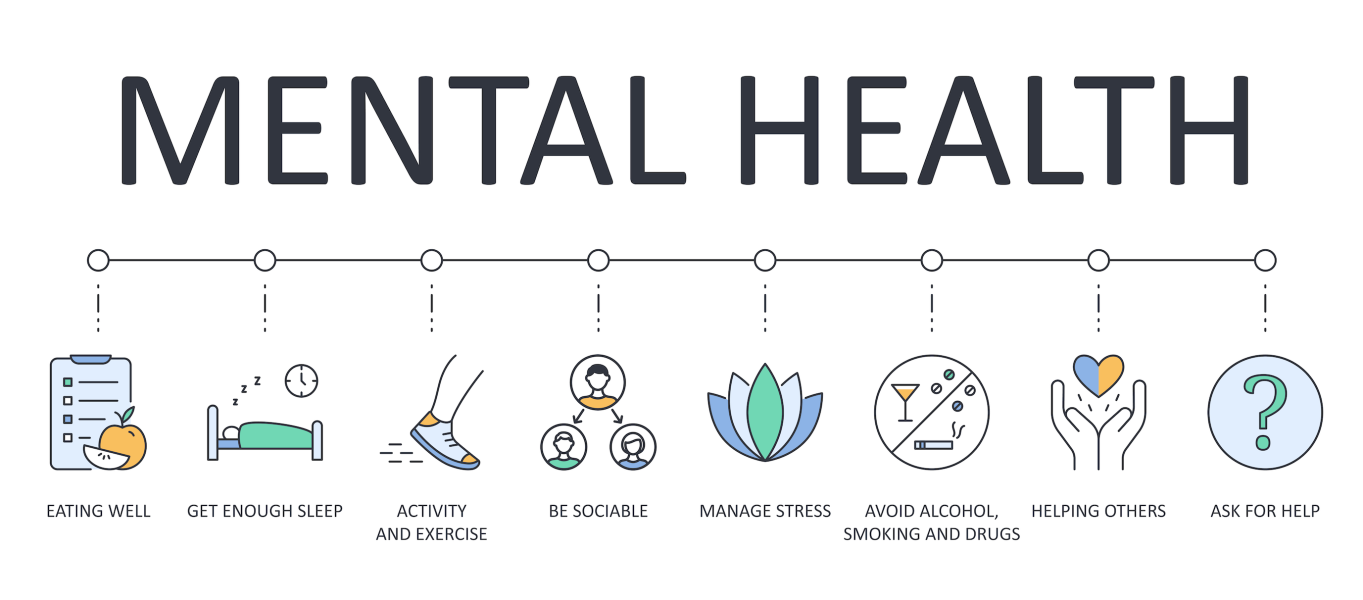Good mental health is a cornerstone of overall well-being. It impacts how we think, feel, and act, affecting every aspect of our lives, from personal relationships to professional success. In this comprehensive guide, we will explore the principles and practices that can help you attain and maintain good mental health.
Understanding Mental Health
- Mental Health vs. Mental Illness: Mental health is not just the absence of mental illness; it’s a state of well-being in which an individual can cope with life’s challenges, work productively, and contribute to their community. It’s a continuum, and everyone falls somewhere on it.
- The Mind-Body Connection: Mental health is closely linked to physical health. Regular exercise, a balanced diet, and adequate sleep can positively impact your mental well-being.
- Social Connections: Strong and supportive relationships are essential for mental health. Social interactions reduce stress and loneliness while fostering a sense of belonging.
Tips for Good Mental Health
- Self-Care: Prioritize self-care activities like exercise, meditation, hobbies, and relaxation techniques. These practices can help you manage stress and maintain balance in your life.
- Seek Professional Help: If you’re struggling with your mental health, don’t hesitate to seek help from a mental health professional. Therapy or counseling can provide valuable tools for coping with life’s challenges.
- Healthy Boundaries: Learn to set healthy boundaries in your personal and professional life. This helps prevent burnout and maintains emotional well-being.
- Positive Thinking: Practice positive thinking and self-compassion. Challenge negative thought patterns and replace them with more constructive ones.
- Mindfulness and Meditation: Mindfulness exercises and meditation can reduce stress and improve emotional regulation. These practices encourage living in the present moment.
- Stay Active: Regular physical activity releases endorphins, which are natural mood lifters. Even a short walk or yoga session can boost your mental well-being.
- Nutrition: A balanced diet rich in nutrients supports brain health. Omega-3 fatty acids, for example, found in fish, have been linked to improved mental health.
- Adequate Sleep: Prioritize sleep as insufficient sleep can lead to mood disturbances, increased stress, and decreased cognitive functioning.
- Engage in Hobbies: Pursuing hobbies and interests you’re passionate about provides a sense of purpose and enjoyment, enhancing your mental health.
- Reduce Stress: Identify stressors in your life and develop coping mechanisms. Stress management techniques like deep breathing exercises and time management can be beneficial.
- Limit Screen Time: Excessive screen time, especially on social media, can negatively impact mental health. Set boundaries and take regular breaks from screens.
- Connect with Others: Cultivate and maintain strong social connections. Friends and family provide emotional support and a sense of belonging.
- Practice Gratitude: Regularly express gratitude for the positive aspects of your life. Keeping a gratitude journal can help shift your focus toward positivity.
- Learn to Say No: Don’t overcommit yourself. Saying no when necessary preserves your mental energy and prevents burnout.
Conclusion
Good mental health is a continuous journey, not a destination. It involves a combination of self-awareness, self-care, and seeking help when needed. Remember that it’s okay to ask for help, and seeking assistance from mental health professionals is a sign of strength, not weakness. By incorporating the principles and practices outlined in this guide into your daily life, you can enhance your mental well-being, build resilience, and lead a more fulfilling and balanced life. Mental health is an integral part of overall health, and investing in it is one of the most valuable things you can do for yourself.

